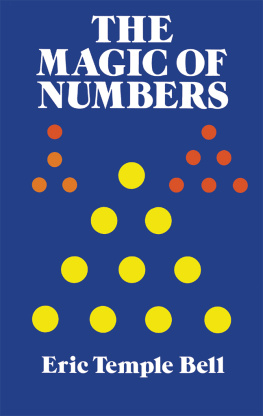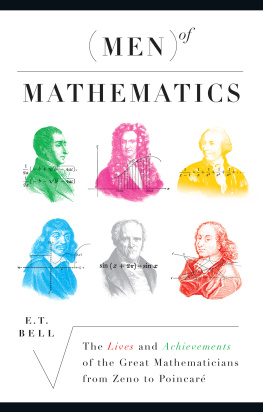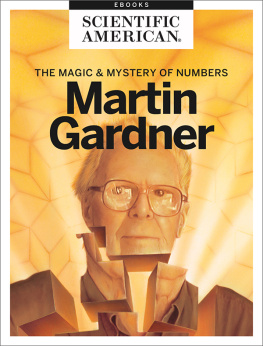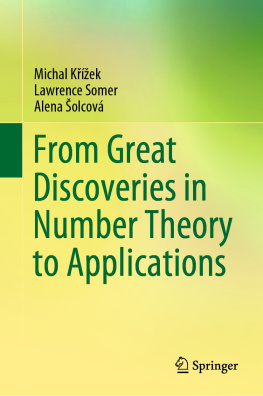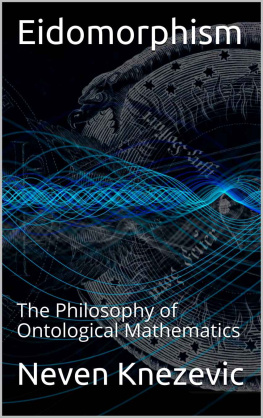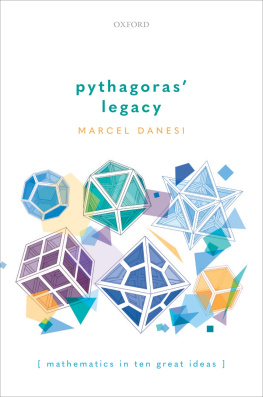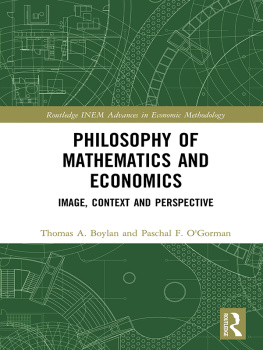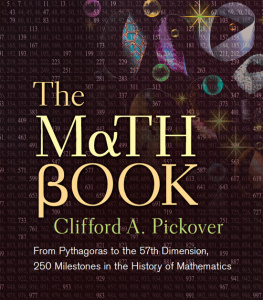Eric Temple Bell - The Magic of Numbers
Here you can read online Eric Temple Bell - The Magic of Numbers full text of the book (entire story) in english for free. Download pdf and epub, get meaning, cover and reviews about this ebook. year: 2014, publisher: Dover Publications, genre: Religion. Description of the work, (preface) as well as reviews are available. Best literature library LitArk.com created for fans of good reading and offers a wide selection of genres:
Romance novel
Science fiction
Adventure
Detective
Science
History
Home and family
Prose
Art
Politics
Computer
Non-fiction
Religion
Business
Children
Humor
Choose a favorite category and find really read worthwhile books. Enjoy immersion in the world of imagination, feel the emotions of the characters or learn something new for yourself, make an fascinating discovery.
- Book:The Magic of Numbers
- Author:
- Publisher:Dover Publications
- Genre:
- Year:2014
- Rating:3 / 5
- Favourites:Add to favourites
- Your mark:
- 60
- 1
- 2
- 3
- 4
- 5
The Magic of Numbers: summary, description and annotation
We offer to read an annotation, description, summary or preface (depends on what the author of the book "The Magic of Numbers" wrote himself). If you haven't found the necessary information about the book — write in the comments, we will try to find it.
The Magic of Numbers — read online for free the complete book (whole text) full work
Below is the text of the book, divided by pages. System saving the place of the last page read, allows you to conveniently read the book "The Magic of Numbers" online for free, without having to search again every time where you left off. Put a bookmark, and you can go to the page where you finished reading at any time.
Font size:
Interval:
Bookmark:

FROM A FRESCO BY RAPHAEL
PYTHAGORAS
About 582-500 B.C .
New York
www.doverpublications.com
Copyright 1946 by Eric Temple Bell.
Copyright renewed 1974 by Taine T. Bell.
All rights reserved.
This Dover edition, first published in 1991, is an unabridged and unaltered republication of the work first published by Whittlesey House/McGraw-Hill Book Company, Inc., New York, in 1946.
Library of Congress Cataloging-in-Publication Data
Bell, Eric Temple, 1883-1960.
The magic of numbers / Eric Temple Bell.
p. cm.
Reprint. Originally published: New York : Whittlesey House. McGraw-Hill, 1946.
eISBN: 978-0-486-16740-4
1. Number concept. 2. MathematicsPhilosophy. 3. MathematicsHistory. I. Title.
QA141.B39 1991
512.7dc20
91-18322
CIP
Manufactured in the United States by Courier Corporation
26788104
www.doverpublications.com
The topic of this book is described in the first few pages of the opening chapter. It concerns what may be the least expected turn of scientific thought in twenty-five centuries. Should this return to a remote pastfor that is what the most recent philosophy of science really isbe generally accepted, our descendants a few generations hence will look back on us and our science as incredibly unenlightened.
Not much of the proposed substitute for the scientific method as commonly understood has been discussed outside professional scientific circles. An untechnical account of the origins and progress of the new approach to nature may therefore be of interest to those who do not make their livings at science. It will appear that the new and the old are strangely alike.
For valuable criticisms and suggestions I am indebted to many friends, professional and other. Though I alone am responsible for what finally got written down, I should like especially to thank Eleanor Bohnenblust, Frderic Bohnenblust, Mary Mayo, and Lasl Zechmeister for their patience and helpfulness with it all, and Nina Jo Reeves for preparing the manuscript for publication. For permission to reprint the excerpts that appeared in Scripta Mathematics I am indebted to the editors of Scripta.
E. T. B ELL


T HE hero of our story is Pythagoras. Born to immortality five hundred years before the Christian era began, this titanic spirit overshadows western civilization. In some respects he is more vividly alive today than he was in his mortal prime twenty-five centuries ago, when he deflected the momentum of prescientific history toward our own unimagined scientific and technological culture.
Mystic, philosopher, experimental physicist, and mathematician of the first rank, Pythagoras dominated the thought of his age and foreshadowed the scientific mysticisms of our own. So varied was his genius that the crassest superstitions and the most uncompromising rationalisms might appeal to his authorityHimself said itall down the Middle Ages. The essence of his teaching was the mystic doctrine that Everything is number, With Galileos revival in the late sixteenth century of the experimental method in the physical sciences, a method in which Pythagoras had pioneered nearly twenty-two centuries earlier, number mysticism passed out of science.
The seventeenth century saw the creation by Newton and Leibniz of a new mathematics, devised to bring the continuously varying flux of nature under the domination of rigorous reasoning. Combining this dynamic mathematics with precise observation and purposeful experiment, Newton and his followers in the seventeenth and eighteenth centuries fixed the modern scientific method for the astronomical and physical sciences. The form they gave it was to stand unchallenged till the third decade of the twentieth century.
The aim of this method was twofold: to sum up the observable phenomena of the physical universe in readily apprehended generalizationscalled by their inventors or discoverers laws of nature; to enable human beings in some degree to predict the course of nature. Always observation and experiment were the first and last court of appeal. However reasonable or however inevitable the verdict of mathematics or other strict deductive reasoning might appear, it alone was not accepted without confirmation by this final authority.
The successes of the method heavily overbalanced its failures all through the nineteenth century and well into the twentieth. In less than two centuries the application of scientific technology to industry wrought a profounder transformation of western civilization than had all the wars and social upheavals of the preceding four thousand years.
Concurrently with this vast revolution in the material world, equally subversive changes from time to time overthrew established creeds that had possessed the thoughts of men for scores of generations. The universe disclosed by science was not always that of revelation and tradition, nor even that which a supposedly infallible logic insisted must be the fact. Here also the absolutes of more than two thousand years were impartially scrutinized. Those that had proved barren of positive knowledge were ruthlessly abandoned. The unaided reason as an implement of discovery and understanding in the exploration of the material universe dropped out of use. Its sterility in science then cast suspicion on it in its own traditional domain. Of what human value were truths immune to any objective test that human beings might invent? Protests that truths other than those of science exist tunelessly in a realm of Eternal Being, and are forever inaccessible to the finite reach of science, were silenced by the dictum, Experiment answers all, Then, quite suddenly, about the year 1920, the most positive of all the sciences began to hesitate.
By the middle 1930s a few prominent and respected physicists and astrophysicists had reversed their position squarely. Facing the past unafraid, they strode boldly back to the sixth century B . C . to join their master. Though the words with which they greeted him were more sophisticated than any that Pythagoras might have uttered, they were still in his ancient tongue. The meaning implicit in their refined symbolisms and intricate metaphors had not changed in twenty-five centuries: Everything is number, He understood what they were saying.
The retreat from experiment to reason was applauded by some philosophers and scientists, deplored by others. But the fact in the new movement was beyond dispute. Either the leaders had gone back to Pythagoras to acknowledge that he had been right all these centuries, or he had come forward to convince them that the modern scientific method of Galileo and Newton is a delusion.
On a first, exploratory pilgrimage to the past the daring ultramoderns had lingered for a few moments in the shadow of Plato. Quickly realizing that in all matters pertaining to the mysteries of number here was only the pupil, they sought his master. Two centuries before Plato was born, Pythagoras had believed and taught that the pure reason alone can reveal the truth of anything; observation and experiment are snares to trap and betray the unwary senses. And of all languages in which constant knowledge as opposed to variable opinion may be described, that of number is the only one on which the pure reason may safely rely. Himself said it, and now, twenty-five centuries after his historic death, he was repeating himself in the language of a nascent science.
Next pageFont size:
Interval:
Bookmark:
Similar books «The Magic of Numbers»
Look at similar books to The Magic of Numbers. We have selected literature similar in name and meaning in the hope of providing readers with more options to find new, interesting, not yet read works.
Discussion, reviews of the book The Magic of Numbers and just readers' own opinions. Leave your comments, write what you think about the work, its meaning or the main characters. Specify what exactly you liked and what you didn't like, and why you think so.

